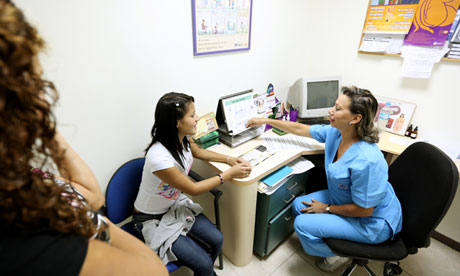
Lately, almost every week somebody asks me when I'll have children. Sexist? A little. Annoying? A lot.
When or whether to have kids is a deeply personal, life-changing decision. Luckily, I have all the tools I need to decide for myself. I have access to family planning methods, and an income to pay for them. More importantly, I have the power in my relationship, my family and my country to choose to use them, without too much pressure (besides subtle hints from mothers).
I'm not a victim of sexual abuse or domestic violence, so I feel safe at home. I know, for now, that I'll have an income even if I get pregnant, and I'll be entitled to benefits through work or social insurance. I have health insurance. I know that if I have a girl, she'll be warmly welcomed into our family. I can have 10 children if I want to – and if I choose to have none, that's also OK. Millions of women and girls aren't so lucky.
One year ago on 11 July, governments and donors came together for a global family planning summit in London. They pledged to spend $2.6bn on family planning in the global south. As a result of this initiative, more than two dozen governments are now working on plans to include family planning in their health programmes. That's an incredible, important achievement. But will it actually give women control over the size of their families? Human Rights Watch, together with many other organisations including Amnesty International and the Center for Reproductive Health, raised concerns that the summit did too little to address the rights of women and girls.
"We have to look at access from [the woman's] point of view," acknowledges Melinda Gates, one of the driving forces behind the summit and a significant funder of reproductive health initiatives. "Can every woman get the contraceptives she wants without coercion or discrimination?"
There's still very little being done to address the laws and practices that cause coercion and reinforce discrimination. It's politically a lot tougher to address than simply opening up more health clinics or increasing supplies of contraceptives. Our work has shown that when health initiatives are not based on women's human rights, they don't deliver. Here are two ways failure to address this properly undermines efforts to improve family planning.
First, some governments deny women the right to decide how many children they have. They pressure women and girls to limit the number of children they have, often for political purposes or to achieve population control. In some countries, women suffer forced sterilisation, in particular Roma women, women with disabilities or HIV, for example in Chile and Uzbekistan.
In Burma, for instance, a two-child policy was introduced for Rohingya Muslims in Rakhine state. The policy is used as an instrument for controlling the population of a persecuted ethnic minority rather than as a way to improve access to healthcare. And in some parts of India the pressure on health workers to meet family planning targets has created a coercive environment for families. More than 50 health workers have told Human Rights Watch that authorities assigned annual targets for contraceptives, with a heavy focus on female sterilisation. The focus of family planning programmes should be less on the numbers reached than on the quality and voluntary nature of the service provided.
Second, governments deny women and girls the right to decide whom they marry and when. Girls who marry young tend to get pregnant young, which has a host of consequences for both them and their children. Child marriage directly threatens health; complications from pregnancy and childbirth are the main cause of death among adolescent girls aged 15 to 19 in developing countries. Young women face greater risks in pregnancy and childbirth than older women, including life-threatening obstructed labour due to their smaller pelvises and immature bodies.
We've documented these issues in South Sudan, where the situation is exacerbated by the limited availability of prenatal and postnatal healthcare. Early marriage also limits knowledge and skills, because girls are often taken out of school and lack resources, social support networks, mobility and autonomy. As a result, they frequently have little power in relation to their husband or his family, limiting their ability to seek family planning and contraception. In other words, to structurally improve access to family planning, governments have to address child marriage.
There are many more obstacles to family planning: women suffer discrimination in healthcare, violence at home, poor quality care, and abuses by health workers. Throwing money at family planning services is not enough. If governments ignore underlying human rights violations it will be counterproductive, leaving the most vulnerable women and girls without the choices available to women like me.

